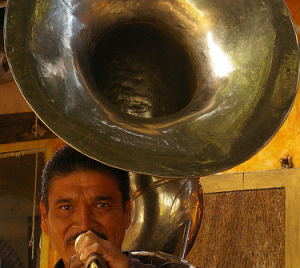Banda Music, Or Tamborazo, Nurtures The Soul
 By Eres Nerd
By Eres Nerd
To me and my family, banda is life. Banda is spiritual renewal. The sounds of the clarinet and sousaphones were part of the Pandora playlist of my childhood. When my parents felt sad or melancholy, the sounds of brass and woodwinds would lift their spirits and transport them back to their small town in Mexico. For most like them in los Estados Unidos, that is what kept them sane while living in a foreign land.
My parents are from Zacatecas, a state located in mid-southern Mexico where the land resembles Appalachia with green mountains and poor soil for farming. Silver and people are its greatest exports. Seeking opportunity in the north, many of my parent’s generation left their state and their country — but they took along their music. As Zacatecanos, my parents love Antonio Aguilar who was from Villa Nueva, and competed with Vicente Fernandez for number movies of appearances in Mexican musicals in the 1970s. For them, La Banda Recodo from Sinaloa was a staple, especially “El Qutelite,” “El Nino Perido” y “El Torito.” The quebradita phase typified by Banda Machos was not as popular with them as with my generation.
For those unfamiliar with Banda, also know as Tamborazo, it is a Mexican musical genre exemplified by a numerous brass and woodwind instruments, with heavy percussion. It is very popular in the Mexican states of Sinaloa, Zacatecas, Sonora and Nayarit and is blasted from trucks wherever a large Mexican community exists in Los Estados Unidos. My impression is that Banda descends from the military brass era of the late 1800s when military bands were probably numerous since Mexico was under a 30-year military dictatorship under Porfirio Diaz. To this day, many Mexican towns have plazas with bandstands “kioskos” placed in its center.
For many, like my parents, you had to listen to Banda live and direct in your hometown. Like many Mexicans, my family would visit my parents’ hometown in Zacatecas during the Christmas season, during the fiestas. As December commenced, caravans of vans and trucks from El Norte stared arrived in my parent’s hometown, people coming from concentrations in California around Santa Ana and San Jose, the Chicago neighborhoods of Pilsen, and the Tejanos in El Paso and San Antonio, others from the plains states of Kansas and Iowa working in meatpacking.
After greeting the relatives, daylight turned to moonlight; the expatriates would wash up and head down to the plaza where the renewal of Banda would begin. Groups would walk around the plaza gossiping and talking to other people, primas and tíos, they had not seen in a couple of years, meanwhile, the Bandas would be standing outside the plaza waiting. Some tequila would be consumed, and then some more. Then, a person living in Chicago or Covina, would wave the Banda towards him; a price was quoted. She might hire them to play one or two songs, but for many, Banda renewal required that the Banda to follow them around the plaza, all over the small town, playing their favorite songs and playing them loudly. Once the music commenced, a Banda line would form with relatives, strangers following the Chicagoan, passing a bottles of mescal, while singing and dancing.
Sitting outside my abuelo’s house, we would hear the Banda line approach singing along “Mi gusto es y ¿quién me lo va quitar? Solomante Dios del cielo me lo quita, ¡mi gusto es!” Another tamborazo would approach to serenade my family. We would follow. We all sang; we all danced. Joy replaced sorrow. Those days gave those expatriates the energy to endure another year in exile — another year trying to give their children a better future.
For me, As the time passed, school and life made it increasing difficult for me return. I had my Banda CDs and memories of those days. As I started a vigorous post-graduate studies, I felt like an expatriate myself being in an environment where my culture was not represented. When it became overwhelming and depression began to emerge, I would drive in my car, pop in the Banda Recodo’s “De Parranda Con La Banda” CD, turn up the speakers and sing. It renewed my spirit and my drive. It worked. Years later, I drive an ostentatious truck and wear a suit.
I continue blasting Banda, because Banda is life.
[Video By salaz86; Photo By mickou]

